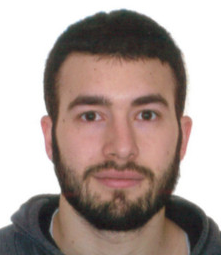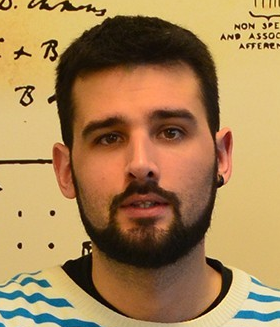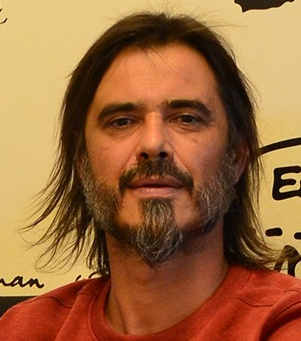Collaborators

Miguel Aguilera is a postdoc student at the Department of Computer Science and Systems Engineering at the University of Zaragoza. He has been a visiting researcher at the Cognitive Science Program at Indiana University and the Ikegami Lab in the Department of General Systems Studies at the University of Tokyo, and a postdoctoral fellow at the University of the Balearic Islands. His research focuses on autonomy in biological and social systems from an interdisciplinary perspective, integrating insights from cognitive science, theoretical neuroscience, computational modeling, adaptive behaviour, and complex systems. It combines nonlinear and dynamical models, evolutionary algorithms, and mathematical analysis from dynamical systems, network and information theory, to generate and understand situated and embodied models of agency in the realms of artificial life and evolutionary robotics, computational neuroscience, collective intelligence practices and socio-technical systems.

Carlos Alquezar is a PhD student at the Engineering research institute of the University of Zaragoza and technical assistant at the Department of Biochemistry and Molecular and Cellular Biology, as an ImageJ software developer. His research interests lie in the analysis and modelling of embodied neural activity in mininal systems. His work combines experimental data and theoretical models of neural activity in order to obtain a better understanding of neural dynamics. Currently, he is focused on the use of maximum entropy models using C. Elegans neural and behavioral data in order to characterize the dynamical properties of a full neuro-embodied system. He is also interested in the design of experiments where neural activity of freely behaving human subjects can be reliably captured through the use of minimally cognitive setups. Finally, he has been working in the development of an opensource platform to register EEG data while subjects are involved in a minimal sensomotor task.

Tomas Gómez got a B.S. and a M.S. Industrial Engineering, University of Zaragoza, Spain (1998), Ph. D. Program Educational Science, University of Zaragoza, Spain (2003), M.S. Biomedical Engineeering, University of Zaragoza, Spain (2013), Ph.D. Educational Sciences and Specific Didactics (Cum Laude), University of Zaragoza, Spain (2015). Regarding his academic positions, he has been researcher at ISAAC (Interdisciplinary Studies in Adaptativity, Autonomy & Cognition), Engineeering School, University of Zaragoza (since 2013), Assistant Professor at the Department of Mechanical Engineering, University of Zaragoza (2006-2011), Researcher at the Multimedia Service, University of Zaragoza (1997-2006), Research internship at Oogziekenhuis Rotterdam, Netherlands, granted by the Erasmus Program (1996-1997). He has been holder of two first awards on Teaching Innovation, principal coordinator of 4 granted projects and participant in more than 20 granted projects on Teaching Innovation, author of 3 scholar books, 4 book chapters, 2 articles in peer-reviewed journals and speaker at more than 20 national and international conferences.

Xabier Barandiaran did a BA in Philosophy at the University of Deusto (Bilbao) and a MSc on Evolutionary and Adaptive Systems (Sussex, UK). He got a doctoral fellowship at the Information, Autonomy and Systems Research Group (University of the Basque Country) in San Sebastian to do a PhD Thesis entitled "Mental Life: a naturalized account of the autonomy of cognitive agents". After finishing his PhD he was a visiting researcher at the Autonomous Systems Lab, at the Polytechnic University of Madrid (Spain) and also at the Konral Lorenz Institute for Cognition and Evolution Research in Vienna. He spent a postdoc at the Center for Computational Neuroscience and Robotics (University of Sussex) and a second year at the Centre de Recherche en Épistémologie Appliquée, CNRS/Polytechnique, in Paris. Next, he became a postdoc researcher of the FP7-Programm research network eSMCs (Extending Sensorimotor Contingencies to Cognition) at the University of the Basque Country. Currently he is a lecturer of the Department of Philosophy at the University School of Social Work at the University of the Basque Country (UPV/EHU). He is a foundational member of the Retecog (Spanish network of research in Cognitive Science).